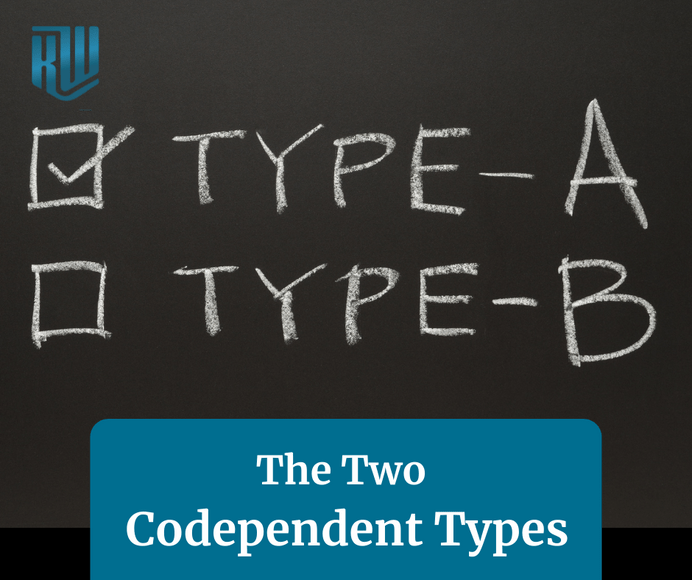Welcome back! Today I’m talking about the fascinating polarity of the two codependent personality types. Codependence can be characterized as living on one end of two extremes.
The typical “disempowered” that we commonly identify with on one extreme and the “falsely empowered” on the other.
The falsely empowered is not very well known or recognized that’s the side I want to dig into.
It is important because our society holds this person up as the ideal .When they are just as dysfunctional as the disempowered. We’re missing out on developing healthy and connected relationships without this information.
Before getting into the specifics of the falsely empowered codependent.
I want to share what I believe to be the six common characteristics the two types share:
- Childhood trauma. In my video What Causes Codependence. I point out how anyone struggling with codependence has been through abusive less-than-nurturing parenting. I know that’s hard to hear, but we in society are out of reality about how deeply our childhoods affect us.
- That’s why I choose, along with Pia Mellody, to call it abusive. We tend to have a limited perception of what abuse looks like, and we miss out on the bigger picture.
- I’m not blaming the parents – we can’t do what we don’t know. But we have to admit this abuse happens and thus creates codependence.
- The perfect imperfections of our parents weren’t intended to be unloving, but they were harmful .we all experience this. Our parents aren’t bad people, nor are we.
- With a more realistic understanding, we can break through this together. Check out my other video on this childhood trauma topic for more details.
Damaged self-esteem.
- The disempowered have little or no self-esteem while the falsely empowered have false esteem, looking for it outside of themselves – this is known as “other” esteem.
- Inability to take care of their needs and wants. The disempowered can be too needy, dependent, and demanding.
- The falsely empowered are anti-dependent, needless, and wantless, which is still codependence.
- Dysfunctional boundaries. The disempowered have no boundaries while the falsely empowered have walls for boundaries .
- it’s again on polar opposite sides.
- An inability to express and own their reality. They both struggle with this immensely.
- The disempowered will see themselves as unselfish and kind.
- When in fact, they are manipulative.
- They’re out of reality that their niceness can set up an abusive and manipulative dynamic.
- it allows the other’s dysfunction to operate and thus enables it. You’ll see this in “empaths” – they are hyper-codependents that have no boundaries.
- A true empath empathizes but isn’t affected by other’s emotions. I’m not saying they aren’t kind and loving . They just aren’t in reality about what they are genuinely doing.
- For the falsely empowered, they don’t see themselves clearly, but they think they do. They believe they are always right and don’t need help.
- They think nothing is wrong with them, that their childhood was wonderful. They’re out of reality in that they’re shut down and defensive.
- They see it as signs of strength, believing that showing emotions is weak. Neither can see the abuse in their childhood or how their behavior is hurtful and abusive towards others.
They both think they’re living in reality but aren’t.
- Inability to express their reality moderately. They both live in extremes and chaos. The disempowered get over-involved: this is an inability to navigate reality.
- They take care of others and sacrifice their own needs. They distort their view of helping others and can’t express their thoughts and feelings moderately.
- They’re hyper-emotional when they express themselves. For the falsely empowered, they are completely detached and emotionless.
- They can’t share they were hurt because they are so detached from the hurt and the relationship. Pia does a great job pointing out how the typical arrogant, grandiose, vulnerable, anti-dependent, perfectionist overachiever has been branded as a healthy adult: they’re really severely codependent.
- The view of a codependent shouldn’t always be a weak and spineless person – there is also the falsely empowered codependent putting up a wall.
- Realizing this can significantly help the disempowered – they know they’re the same as the grandiose person and don’t feel negatively towards themselves.
Many people can have traits of both disempowered and falsely empowered
I am an example! I inadvertently put other writers down by celebrating Pia: that’s my grandiosity and codependence. On the other side, sometimes I sign off a show with low esteem, quietly asking people to share.
We are all battling these things. Part of the recovery journey starts on one side and swings to the other – I do this all the time! I try to work on how I communicate my thoughts and ideas to be less grandiose or condescending.
I, like all of us, went through severely abusive and less-than-nurturing parenting.
But this doesn’t mean we don’t also go through nurturing, loving, beautiful moments as a child. We all experience the perfect and imperfect.
That’s healthy and moderate. My parent’s perfections left me with fantastic memories. Mostly of Christmas with beautiful lights, presents, and my dad happy and not detached.
It was the one time a year I got to spend with my father perfectly attuned – parents will do this all the time. I just want us to get into reality about the imperfect and perfect moments. I’m asking that we consider both sides do exist, and both are equally OK – the perfections and imperfections.
Let’s get into the falsely empowered a little more. Those disempowered will feel far less bad when they see the closed-off successful person is no different from themselves.
The falsely empowered will:
- Seek “other” esteem through career and social status. This is the primary mechanism – everything in American is about to achieve, achieve, achieve.
- The most successful people are the most broken. They are driven by a shame core of feeling less than. Yet it’s expressed as better than. Career, social status, social media likes drive their value. The disempowered does this by doing for others. See how similar they are?
- Rarely know what they’re feeling. They’re most often blank and detached. They can’t feel, and they can’t communicate their feelings.
- See feelings as a weakness while they minimize their own.
- The typical male CEO will say he doesn’t bring feelings into the board room.
- This is a lack of understanding of how the brain and body work together. Every thought we have starts with a feeling! We’re starting to turn women into this, which is devasting .
- we are asking them to forget their inherent gift.
- We’re beginning to see many more women falsely empowered and men disempowered in an attempt to bring equality – it’s hurting both sides.
Use isolation, anger, or humor to hide their feelings.
- Lack empathy and interest in other’s feelings. This is one reason why falsely empowered, and disempowered people are drawn to each other. It is a continuation of their childhood experience that created their mutual codependence.
- Not ask for or accept help. Sometimes they may not even mention when something terrible happened – to do so would create connection, and they fear connection.
- They hide from and mask their emotional pain. I struggled with this – expressing physical pain was difficult. If I came home hurt and my ex-wife asked what happened.
- I would immediately get angry. Sometimes I would be completely detached from physical pain, which brings in an important point.
- Our spectrum of codependence is physical, emotional, spiritual, and intellectual. We can be emotionally on one side and physically on another.
- Label, judge and criticize others persistently. I do this all the time! You can see it in my videos. The reason I get haughty and think I’m better than others.
- It is because I couldn’t persuade my father to hear and embrace the truth about our situation.
- I need to be able to back up my claims. As a result of my own sense of inadequacy and insignificance. I seek external affirmation.
Be indifferent, authoritative, or use rage to control.
- Rarely admit their mistakes and must be right all the time. You see this in CEOs – part of their gift is that they are headstrong! But it comes with detriments.
- Try to control and shape other’s thoughts. If you’re disempowered, you’ve been through this.
- Use sex, money, intellect, charm, and gifts to manipulate, control, and have power over other people. This trait has strong connections with narcissism.
- Avoid emotional, physical, and intellectual intimacy to keep control and distance. They may be too busy working, taking care of the kids, with their hobbies. We think it makes them strong and powerful, but it’s avoidance.
- Use illness or addiction to avoid real intimacy and connection. Almost all illness and disease is brought on by the environment which is your emotional condition.
- People don’t think they make themselves sick . it’s because we have a lack of understanding. Western medicine only gives us 50% of what we should know.
- Decades of research and proof say you cannot separate the body and mind regarding illness and disease.
- So it’s not a question as to whether our emotions make us sick – it has been proven.
- Deny childhood trauma. The falsely empowered see their childhood as perfect – no ones is.
- Be resistant to or will rarely seek help. That’s the grandiose position that they have to be right. Many falsely empowered likely would’ve stopped reading at this point.
It’s too confronting. Healthy adults can take information from all sides and navigate their emotional reactions to it.
The biggest stumbling block for both is their denial. Neither are in reality of the damage from their childhood and therefore can’t see and admit who they really are.
But they both think they know who they are. Both sides lack compassion for themselves and self-esteem. They abandon themselves at the extremes.
I hope this helps you separate the two polarities of codependence and shines a light on the rarely discussed falsely empowered. For genuine connection and intimacy to form in a relationship, it will require us to understand the impact of our perfectly imperfect childhoods and heal the codependence that resulted.
Enjoy The Journey!
Learn more here:
Heal Your Codependence TODAY!





